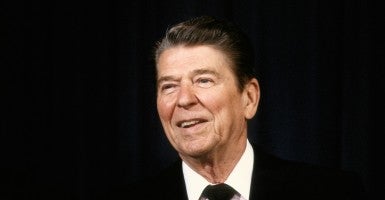Hollywood liberals are known for their contempt of conservatives, but their idea to produce a “comedy” about a demented President Ronald Reagan in his second term is far more offensive than usual. It’s also at total variance with the facts. Actor Will Ferrell appears to agree, and has announced he will not take part in such a film. This announcement came after it was widely publicized that he would play Reagan.
The idea that Reagan was suffering from Alzheimer’s disease or some form of dementia during his presidency has been definitively addressed and dismissed by Pulitzer Prize biographer Edmund Morris. After reading all 500,000 words of Reagan’s scrupulously maintained presidential diary, Morris concluded that all eight years of it “was uniform in style and cognitive comment from beginning to end.” There was “no hint of mental deterioration” beyond occasional repetitions and non sequiturs. If these are suggestions of early dementia, Morris said, “many diarists including myself would have reason to worry.”
There is also the remarkable Reagan record of the second term that includes his three summits with Mikhail Gorbachev that produced the Intermediate-Range Nuclear Forces (INF) Treaty and set in motion the forces that ended the Cold War without a shot, in Margaret Thatcher’s memorable phrase; his dramatic challenge at the Brandenberg Gate “to tear down this wall!” which came tumbling down some 18 months later; his 1986 tax reform that lowered the top marginal rate from 50 percent to 33 percent, simplified the number of tax brackets, and eliminated hundreds of special interest provisions such as the “three martini” lunch; his leaving office with a final approval rating of 63 percent, the highest of any president to that point.
In his farewell address, Reagan echoed his famous 1964 TV address, “A Time for Choosing,” by reiterating the central role of the American Revolution in our history. He said: “Ours was the first revolution in the history of mankind that truly reversed the course of government, and with three little words—’We the people.’”
“We the people,” said Reagan, “tell the government what to do, it doesn’t tell us.” The idea of “we the people,” he explained, was the underlying basis for everything he had tried to do as president.
And then, having restored Americans’ confidence in themselves and their future, having ignited an unprecedented period of prosperity with his economic reforms, and having ended the Cold War with a treaty and not a nuclear holocaust, he went home, having done his duty and served his country as few presidents have in our history.
And that’s no joke.





























